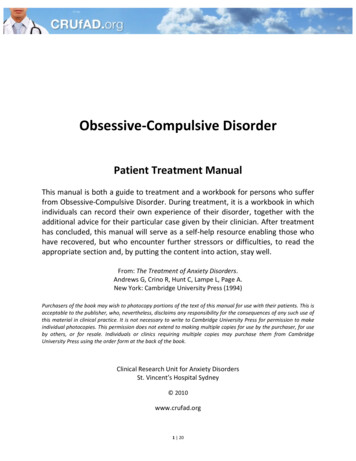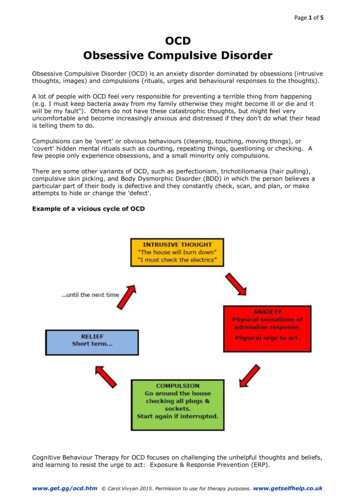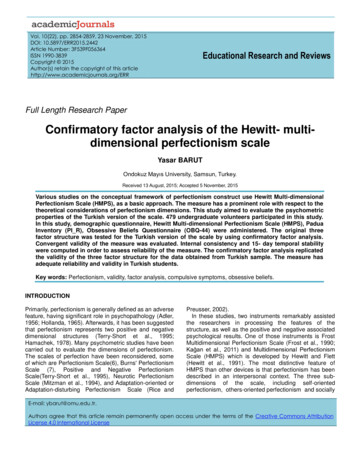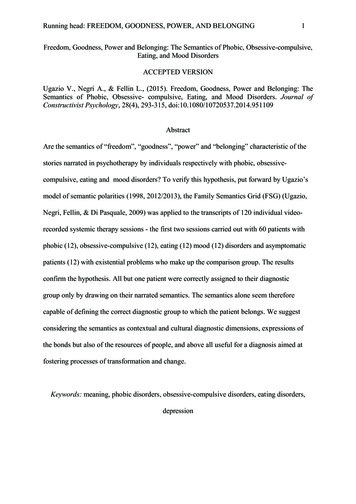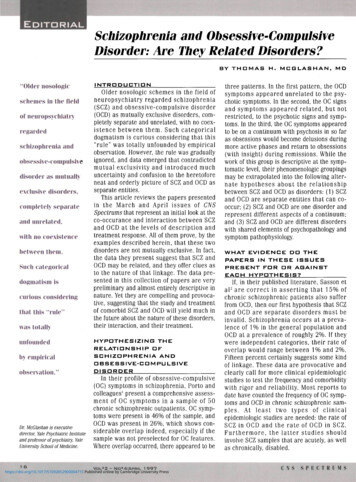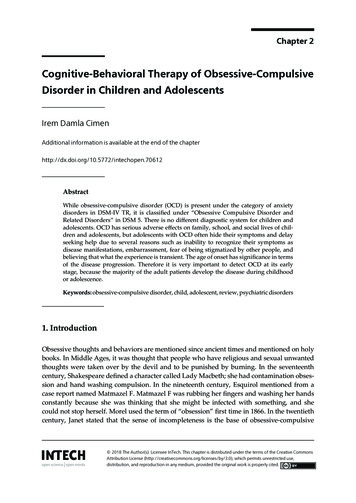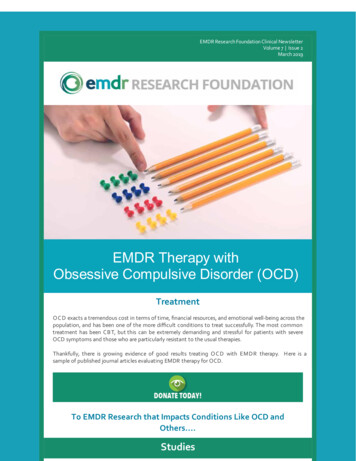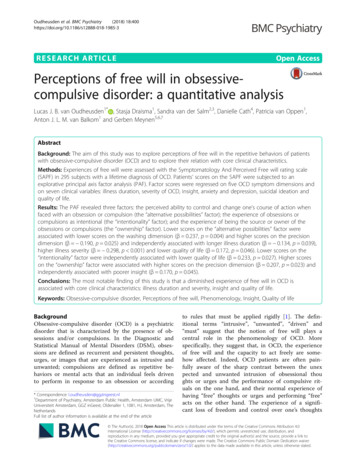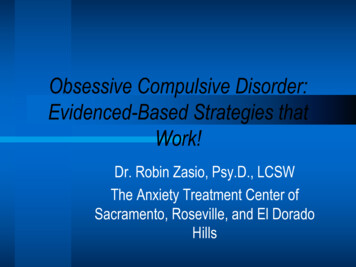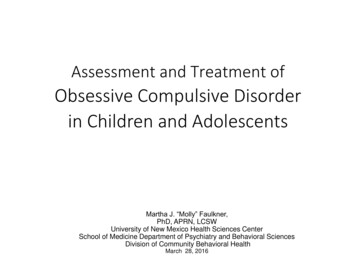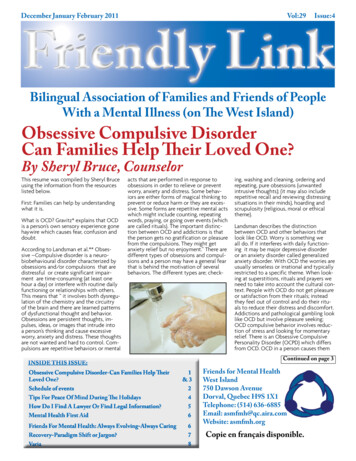
Transcription
December January February 2011Vol:29Issue:4Bilingual Association of Families and Friends of PeopleWith a Mental Illness (on The West Island)Obsessive Compulsive DisorderCan Families Help Their Loved One?By Sheryl Bruce, CounselorThis resume was compiled by Sheryl Bruceusing the information from the resourceslisted below.First: Families can help by understandingwhat it is.What is OCD? Gravitz* explains that OCDis a person’s own sensory experience gonehaywire which causes fear, confusion anddoubt.According to Landsman et al.** Obsessive –Compulsive disorder is a neurobiobehavioural disorder characterized byobsessions and/or compulsions that aredistressful or create significant impairment are time-consuming (at least onehour a day) or interfere with routine dailyfunctioning or relationships with others.This means that “ it involves both dysregulation of the chemistry and the circuitryof the brain and there are learned patternsof dysfunctional thought and behavior.Obsessions are persistent thoughts, impulses, ideas, or images that intrude intoa person’s thinking and cause excessiveworry, anxiety and distress. These thoughtsare not wanted and hard to control. Compulsions are repetitive behaviors or mentalacts that are performed in response toobsessions in order to relieve or preventworry, anxiety and distress. Some behaviors are either forms of magical thinking toprevent or reduce harm or they are excessive. Some forms are repetitive mental actswhich might include counting, repeatingwords, praying, or going over events (whichare called rituals). The important distinction between OCD and addictions is thatthe person gets no gratification or pleasurefrom the compulsions. They might getanxiety relief but no enjoyment.” There aredifferent types of obsessions and compulsions and a person may have a general fearthat is behind the motivation of severalbehaviors. The different types are; check-ing, washing and cleaning, ordering andrepeating, pure obsessions (unwantedintrusive thoughts); (it may also includerepetitive recall and reviewing distressingsituations in their minds), hoarding andscrupulosity (religious, moral or ethicaltheme).Landsman describes the distinctionbetween OCD and other behaviors thatlook like OCD. Worry is something weall do. If it interferes with daily functioning it may be major depressive disorderor an anxiety disorder called generalizedanxiety disorder. With OCD the worries areusually senseless or irrational and typicallyrestricted to a specific theme. When looking at superstitions, rituals and prayers weneed to take into account the cultural context. People with OCD do not get pleasureor satisfaction from their rituals; insteadthey feel out of control and do their rituals to reduce their distress and discomfort.Addictions and pathological gambling looklike OCD but involve pleasure seeking;OCD compulsive behavior involves reduction of stress and looking for momentaryrelief. There is an Obsessive CompulsivePersonality Disorder (OCPD) which differsfrom OCD. OCD in a person causes themContinued on page 3Friends for Mental HealthWest Island750 Dawson AvenueDorval, Quebec H9S 1X1Telephone: (514) 636-6885Email: asmfmh@qc.aira.comWebsite: asmfmh.orgCopie en français disponible.
Calendar of EventsTRAINING FORCAREGIVERSCAP SCHIZOPHRENIA(French; 20 for materials)This 10-week psychoeducational program onschizophrenia has been adapted to respond to theneeds of families. It helps families develop theiradaptive skills so they can cope with the chronicity of the disease and possible crises caused by theacute phases of the illness.Must register.January 26 — March 30Wednesdays, 6:30 — 8:30 p.m.BORDERLINE PERSONALITYDISORDER( 20 for materials)For families who have a loved one with a borderline personality disorder. The aim of this programis to educate families about this disorder - how itpresents itself and what its challenges are - andwhat changes can be put in place to improve thequality of their lives and that of the ill person.Must register.English, February 16 — June 1, 1:00-3:30 p.m.French, February 15 — May 31, 6:30-9:00 p.m.WORKSHOPSHEY! WHAT ABOUT ME?Taking care of our own needs is not selfish - it is anecessity. While we gain a better understandingof stress and how to reduce its effects, we will investigate how to increase resilience and happiness.We will also look at our conflict resolution stylesand how to communicate assertively.Must register.February 28 — March 28Mondays, 6:30 — 8:30 p.m.SUPPORT GROUPS FUNDRAISERBORDERLINEPERSONALITY DISORDERSUPPORT GROUPSWednesday, December 16:00 — 9:00 p.m.Only for families that have taken thecourse.SHOP FOROUR CAUSEEnglish & French: Tuesday,February 8, 6:30 — 8:30 p.m.English & French: Wednesday,February 9, 1:00 — 3:00 p.m.PSYCHOSIS SUPPORTGROUPSFirst Thursday of the month 5:30 —7:00 p.m. (English) third Thursday of themonth. Must register.5:30 — 7:00 p.m. (French)English, February 11 & 18, 10:00-12:30 p.m.French, February 17 & 24, 6:30-9:00 p.m.A portion of the sales will bedonated to Friends for MentalHealthjewelryXmas decorhome & officeSUPPORT GROUP FORYOUTHDo you have a parent, sibling or friendwith a mental illness? Would you liketo meet and talk with a group of yourpeers who share similar difficulties?Ages 13 — 16: First Friday of the month4:30 — 6:30 p.m.Ages 17— 25: Third Friday of the month4:30 — 6:30 p.m.NAVIGATORSSocial club for children who havecompleted the Anna workshops. Nextmeeting will be heldDecember 10, 5:00 — 8:00 p.m.ART THERAPYPre HolidaySupperMonday November 29th, 2010 at6:30 p.m.At Restaurant Malewa4844 Rue WellingtonVerdun, H4G 1X4Price 5 (Beverages not included)Buy tickets before November 15**Limited seatingFOR CAREGIVERSMondays: 10:00 a.m.— 12:00 p.m.(English) and 1:30 — 3:30 p.m. (French)New session starts January 10.Must register.NOURISH THE PART THAT WANTSTO LIVE: A workshop for families onMUSEUM OUTINGsuicide preventionHave you had to intervene in a loved one’s suicidalcrisis? Or fear that one day you may have to? Thisworkshop on suicide prevention will help you tounderstand suicidal and self harming tendenciesand give you concrete tools to intervene appropriately when necessary. Must register.Dix Mille Villages290 Bord du Lac, suite 108Pointe-ClaireVisit the exhibition of Otto Dix, one ofthe most important German paintersof the twentieth century.Rouge Cabaret: The terrifying andbeautiful world of Otto Dix followedby an art activity on site.When: Dec. 8, 2010, 9:45 — 12p.m.Where: 2200 Crescent Street (side entrance of the Museum of Fine Arts)LIAISONCOUNSELLOROUR PRESENCE AT THELAKESHORE GENERALHOSPITALA counsellor is available in Psychiatry (4 East) at the Lakeshore GeneralHospital on Tuesday evenings from6:30 to 8:30 p.m.
Obsessive Compulsive DisorderCan Families Help Their Loved One?to be distressed. If they have OCPD they do not tend to be botheredby their overbearing, inflexible approach to life. These people oftenfind themselves in frequent conflict with others in their work andpersonal lives.Continued from front pageParticipation in time consuming rituals: Initially you may havehelped out with the ritual to make it go faster, but eventually itbecomes a necessary element of the ritual. They have given theresponsibility to you, perhaps and you do it but it becomes necessary for you to do it.Second: Families can understand treatment better.Family members need to understand that a person cannot just quitcold turkey. They need some tools and strategies. The treatmentof choice is Cognitive Behavior Therapy (CBT). CBT is done whenthe person decides they are ready for it and with their permission.With the help of the therapist a sequence of exposures and ritualprevention is outlined and paired with new ways of interpreting thethoughts. When armed with these strategies to use, the person systematically faces their fears. They do not use the old coping techniques, instead new thoughts and coping skills are practiced throughsmall exposures. The exposures are increased slowly so that theperson practices using the new coping strategies exposing himselfor herself to small amounts of distress and increasing the exposureas the person learns to manage and master the distressing feelingsand thoughts. The precise way to approach the hierarchy of exposure and how to examine thoughts is excellently explained for theill person in Grayson’s Book, Freedom fromObsessive Compulsive Disorder (2003).*** Inhis first chapter he describes the underlyingcore feeling of uncertainty as the main issuethat causes the repetitious thoughts and behaviors. He feels that a person could use thisbook as a self help workbook to help makesignificant changes.Third: Families can understand how they accommodate the OCD and start to change theway they interact with their loved one.When family members accommodate theperson it helps to reinforce the OCD behaviors. If your family is accommodating a number of behaviors,then change needs to be slow; almost one at a time because of thedistress it will cause. If the person is not in therapy, they probablydo not have other tools or strategies in place. You need to be awarethat making them face their fears can be very threatening. (We suggest you get help either with us here at Friends for Mental Illness orby contacting the professional treating your person to make a planof action.)According to Dr. Herbert Gravitz research has consistently foundthat 90% of family members subvert their personal and family needsto accommodate their loved ones OCD symptoms. Landsman et al.describe seven ways that families accommodate their loved ones.Providing Reassurance: “This is when you tell your loved one something to make them feel better. With OCD you repeatedly reassureyour loved one. S/he may ask you the exact same question over andover again or reword the question in many different ways. Sometimes your response becomes part of the ritual so that there arerules about how your reassurance should be worded.”Avoidance: This is the situation when you have avoided a certainplace, person, thing or topic of conversation for fear of triggeringan OCD moment. Avoiding is just another way of giving OCD morerespect than it deserves.Assistance with decisions or simple tasks: Family members feel likethey need to take over making choices or decisions for their lovedone. This undermines the goal of risk taking. There is risk in makinga decision because it may turn out wrong or less perfect, whichdoes not allow the person to learn that the consequences arenot fatal and can be lived with; and we can adjust to mistakes andfailure.Modification of your work, family or social responsibilities androutines: Families find that they often change their schedules orroutines for the day because it might interfere with taking care of aloved one’s OCD concerns.Assuming your loved one’s responsibilities: Family members canbecome trapped in this form of accommodating often out of guiltor they feel bad for their loved one.Tolerating abnormal behaviors or conditions:Families accept more and more behaviors asnormal for them, but then these behaviorsaffect them in the long run. They may feelembarrassed or confused or they have madeconcessions that put them at the mercy of theill person.According to research cited by Landsman**,the more family members participate inaccommodating behaviors the more severesymptoms become and the lower the level offunctioning becomes for the loved one withOCD. Also the more family members participate in accommodating behaviours, the greater the level of familydysfunction and negative attitudes toward the person with OCD.This happens when accommodation is accompanied by negativeattitudes of resentment and hostility which lead to conflict andsore feelings. This could also lead to distancing and both excessdistancing and conflict start to cause dysfunction. Next, theresearch shows that when family members decrease avoidanceand decrease their involvement in accommodating behaviors, theirloved ones to do better in treatment. Lastly, the family environment has an important impact on the person with OCD. Expressedexcessive criticism, hostility or anger has a negative impact of theloved one with OCD. This can lead to relapse of symptoms. Theperson with OCD then feels greater frustration, shame, guilt andother negative feelings about themselves, which can affect theirmotivation to change and commitment to the process of cognitivebehavior therapy. Landsman’s** book is a work book for families tolook at all these issues. If you use the workbook it can help youto see the effect the illness has on your life and it can help shine alight on where to start making changes.*Obsessive Compulsive Disorder: New Help for the Family by Herbert Gravitz, Ph.D. 1998** Loving someone with OCD: Help for You and Your Family byKaren Landsman Ph.D. K Rupertus, MA, MS and C Pedrick, RN 2005***Self Help for the Ill person: Freedom from Obsessive compulsive Disorder by Jonathan Grayson,Ph.D. 2003
The Holidays Revisited WithBorderline Or Bi-Polar DisordersJaimie Byrne, Monique Caissie andSheryl Bruce -CounsellorsDecember is almost here. It’s a time to see our families and relive all those wonderfulholiday memories. But are they wonderful? Let’s face it, if we are caring for someonewho suffers from a mental illness, we need to stress-proof our expectations and approaches as much as possible.If our loved one suffers from a mood disorder or a personality disorder, they may be more fragile when their routine gets disrupted.Adding unreasonable expectations of the “perfect holiday season”, traveling or parties can be a recipe for a set back. Additionally, weneed to face the reality that the holidays have the highest rates of depression and suicide.So how do we take control of the holidays so that they don’t control us? Make mental health the priority, not the holiday and all itstrappings. Reframe your expectations to work within the boundaries set out by the ill person’s health needs and also your needs.If your loved one suffers from borderline personality disorder (BPD), be respectful of their disorder. Ask yourself a few questions if youare having people over. How does your person usually react in social situations? Try and understand what their underlying feelingsmight be. Consider if they are self-conscious, sad, feeling judged, angry or hurt and what might be triggering those feelings. Accommodating to their sensitivities as much as possible will go far in reducing their stressors and yours. For example, should they refuse tocome out of their room or to come to your party, do not take it personally. It might be preferable to have smaller/calmer gatherings ifyou wish to have them attend. With BPD, being predictable and letting them know ahead of time what is expected of them is the keyto reducing their stress.If your loved one suffers from bi-polar disorder, holiday stressors can trigger a manic episode. Helping them check into how they feelcan keep the pressures and anxiety under control. Ask them how they are doing right now on a scale from 1 to 10 of feeling in control.Discuss what upcoming activities might cause anxiety and whether an alternative plan may be needed. Let them hear your support andcaring and keep the lines of communication open. Get their agreement as to what you will do if you suspect they are presenting somesymptoms. Spending may be the biggest obstacle if your loved one suffers from bi-polar as it might trigger a manic episode. Discussing how to handle gift giving in advance goes far in keeping things under control. Consider some alternatives such as no gift giving toadults or only handmade gifts. Do not feel guilty for introducing this concept to your extended family if someone balks at it becausethey started buying gifts for everyone in July. Doing what is right for you and your loved one is part of a happy holiday season.Everyone benefits when we begin to review our holiday plans with an open mind and consider changing our traditional ways of doingthings. If travel has always been a part of our plans, the disruption to our sleep may be too big a price to pay in the long run. We maydecide that all the junk food and alcohol we normally have is too stimulating and we might start a new tradition where no alcoholis served. Have an agreement and be prepared to leave early with your loved one if an event is too stimulating. Have a secret signalthat you can give each other, like gently tugging on the other person’s ear to let them know you think it’s time to leave. Discuss this inadvance.Say “NO” without guilt. If you used to cook the turkey and invite everyone over, it might be time to let someone else have a turn. It’snot necessary to decorate the house the same as every previous year. If it’s too much work to put up the tree, then don’t. The holidayscan be about being together and feeling grateful for one another. This brings us back to gifts. When discussing bipolar and the holidays,Julie Fast states that she “stopped seeing Christmas as a spending orgy and decided it was more about family. If you are religious, thenthis may be a good time to rediscover what the holidays mean to you outside of shopping. Whether it’s Christmas, Hanukkah or theparticular holiday your country celebrates, try to make this year the year you change the focus from things to people. It’s a lot lessstressful and very few people ever became manic from a family hug!”For many, the holidays can be a difficult time to be alone. If this is your case, we hope you will seek out community, religious or socialevents. Volunteering our time is a good way to lift our spirits and may broaden our connections. Make a plan in advance. Don’t just letthe holidays happen without anticipating what may be needed and communicating it to the appropriate people. Prevention is alwayseasier (and faster) than a cure.From our families to yours – Happy Holidays!!References.Positive and Stress Free Holidays with Julie A. Fast at www.bipolarhappens.com.
How Do I Find A Lawyer Or Find Legal Information?Monique Caissie, CounselorWhen we are faced with a person sufferingfrom a mental illness, we can easily becomeoverwhelmed with an average day. Whenthings become muddied by legal issues, thiscan trigger a lot more difficult emotions suchas guilt or fear of reprisals. Additionally, we areburdened by having to explain our situationsand decisions to others. Having the right information, representation and support is critical inreducing our guilt for the actions we may haveto take. Sometimes we seek legal counsel witha particular goal in mind and at other times it ismore of a preventative measure or to be betterinformed “just in case”. Either way, the processcan be time consuming, so patience will serveyou well.Why would I need legal counsel?Sometimes it is obvious we need to consultsuch as when we realize that the fallout fromthe ill person’s behaviours has rendered therelationship toxic and beyond repair, whichmay require a legal termination. We have seenscenarios where someone is divorcing someone with borderline personality disorder. In order to increase the chance of a good outcome,they would need a lawyer who is sensitive tothe fact that BPD sufferers might turn it aroundand accuse the victim of abuse as being the“abuser”. The lawyer should be prepared todefend their client and appropriately deflectthe ill person’s accusations. Another exampleis where, out of love, we have decided to haveour ill person move in without a plan to moveback out, and they have become a permanentfixture in our home. If we ask them to leaveand they refuse, we may need to consult with alawyer who can advise us on the articles of lawconcerning both eviction and mental illness.Finding the right lawyer means they know morethan just one area of law, but also the particularities dealing with mental illness and whichcan change the outcome.There are myriads of reasons to consult alawyer and we cannot list them all here. Ourgoal may be to set new legal boundaries, tryingto defend ourselves against unjustified claimsor harassment or deciding to leave a businesspartnership. As we age, we begin to worryabout the long term financial well being of ourloved one and may wish to start investigatingthe different trusts and wills available. Anotherexample is that someone may want to havetheir person declared incompetent or trying toprovide them with a tutorship in the event thatthey can no longer care for them.At times, we are called by people who say theirloved one is the person in need of a lawyer.Recently, I received a call from someone sayingthat her son suffers from bi-polar disorder, hadtried to get himself hospitalized because hefelt out of control and suicidal but that theykept sending him home. While in a manic state,she told me that he committed a crime andnow he is in jail where they are not givinghim his medication because “they are not ahospital”. In this case, she is trying to helphim defend himself and get him the help heneeds and is consulting a lawyer.lawyer (others may call it a “comfort zone”).Lawyers should not be making big promisesand should be able to give examples ofoutcomes. If you are going into a situationthat can be very costly, make sure you askfor references and question them on theirHow to find a lawyer?approach and goals in your case. If you don’tThe best way is through word of mouthlike the way they handled your question,referral. If someone you trust can vouch for they are probably not a good fit and youwork previously done in a similar case, then don’t owe them anything. Even if you haveyou stand a better chance of getting some- paid for a session or two, walking away earlyone appropriate. Failing that, you have tois better than regretting keeping a lawyerdo some homework and interviewing to get that did not deliver as promised or that youthe right match. I cannot impress upon you felt you didn’t trust.the need to stay patient and calm whileyou search and not take the first personFree legal advice.you find.In Montreal, we are fortunate in that wehave many avenues to get free legal inforThere are free legal clinics for non-compli- mation which can help us determine if wecated issues which I will go over later.need to seek “real legal advice”. These inHowever, if itis complicated, clude the West Island Community Resourceyou willneed to look Center for West Island residents at (514) 694at adirectory of 6404, the McGill University clinic which islawyers whoopen to everyone; a legal information clinicadvertise theirat the YWCA; a rental board legal clinic atspecialties. These the YMCA on Stanley Street; and anotherdirectories mayone servicing Concordia students. Additionoffer thefirst sessionally, you may be eligible for legal aid but theat a verysmall fee. Theincome must be very low. For example, tomost popularone is Le Barreau de qualify for full legal aid, you must be singleMontreal. (Their website is: www.barreau.with no children and earn under 12,844qc.ca/montreal). When you call, you canannually or have a spouse and 2 or moreask for two or three names of lawyers who children and earn under 21,060 annually ordeal with your particular situation. Thosesome situation between those two. If yourwho are very well known or whose pracincome is quite low, you may still qualify fortices are very large might not be listed. Itsome assistance and you should check outis important to do a preliminary interviewtheir website at: http://www.ccjm.qc.ca/over the phone to see if you feel comfort- pages/profil eng.html.able in meeting with them.What is your story?When you speak to them initially over theWe are always trying to accumulate approphone, you should have written down thepriate resources for our members. If youkey points that you are mainly concernedhave had to seek legal advice and you werewith. This is like when you go to the doctor successful in finding someone who wasand write out your main concerns ahead of sensitive to the particularities attachedtime. You should list what the problem isto mental illness, we hope you will call usin one short sentence and say what resultand tell us about your experience good oryou are most concerned with achieving.bad so that we may have some ideas whenThe lawyer should be telling you right away we are asked for guidance. Also, if there ishow the law might apply to this case anda particular situation that you have overthey will either sound as though they’recome or wish we could have helped youready for a fight or help you to view it from with, we hope you will share your experia more conciliatory stance. This will giveence with us.you an idea as to their approach. You canask them if they have dealt with this typeLet’s be Friends to one another by sharingof case before and then what the outcome information because we all need that in ourwas. Do not be bullied by any pressuretoolbox.tactics, you are in control.Additional web references: (Blog) – http://An honest lawyer will let you know rightwww.wisegeek.com/how-can-i-find-aaway that this is not in their specialty orgood-lawyer.htm; (West Island Communityif they can refer you to someone else.Resource Centre for list of resources) –You must feel very comfortable withhttp://www.crcinfo.ca/; (McGill Universityyour lawyer. You must develop a workingfor everyone) – http://mlic.mcgill.ca/MLIC.relationship with your lawyer and therehtml; (Women’s YWCA for everyone) –fore you must feel that you “trust” yourinfojuridique@ydesfemmesmtl.org; and (ForConcordia students) – legalclinic@csu.qc.ca.
Mental Health First AidWhat is Mental Health First Aid CanadaOne in three Canadians will experience a mental health problem at somepoint in their life. The earlier a problem is detected and treated, the betterthe outcome. Mental Health First Aid Canada gives people the skills to provide that early help that is so important in recovery.Mental Health First Aid (MHFA) is the help provided to a person developing amental health problem or experiencing a mental health crisis. Just as physicalfirst aid is administered to an injured person before medical treatment canbe obtained, MHFA is given until appropriate treatment is found or until thecrisis is resolved.The MHFA Canada program aims to improve mental health literacy, andprovide the skills and knowledge to help people better manage potential ordeveloping mental health problems in themselves, a family member, a friendor a colleague.The program does not teach people how to be therapists. It does teachpeople how to: Recognize the signs and symptoms of mental health problems. Provide initial help. Guide a person towards appropriate professional help.MHFA shares the same overall purpose as traditional first aid – to save lives.It aims to: Preserve life where a person may be a danger to themselves or others. Provide help to prevent the mental health problem from developinginto a more serious state. Promote the recovery of good mental health. Provide comfort to a person experiencing a mental health problem.Friends for MentalHealth: Always Evolving – Always CaringWho do you know who is witnessingsomeone they love as suffering froma mental health illness? At Friends weunderstand and offer them a safe placeto openly discuss related issues, brainstorm options, educate themselves orfind some hope.I am the newest member of the counselling team here.While working for a different organization, although I haveoften referred potential members to Friends, I had neverrealized just how much this association offers. Despiteour struggle to always look for funding, our evolution andgrowth has been impressive. Ten years ago, we offered10 hours of counselling a week to be shared amongst ourmembers and a part-time administrator. Today, we have 4counsellors, an art therapist, and 3 people on our administrative team (2 part-time).One might say that counselling can be stigmatized just asmuch as mental health disorders are and some wait until acrisis to ask for help. I can’t impress upon you how muchit helps to talk to someone who “gets it” and who mayhave some ideas and information we may not be awareof. We also assist people with the process of requesting apsychiatric evaluation when their loved one is a danger tothemselves or others as well as follow up services. That isprobably one of the most difficult processes our familiesmight have to face, and doing it without support is excruciating.Program HistoryThe Mental Health First Aid (MHFA) training course was developed to helppeople provide initial support for someone who may be developing a mentalhealth problem or is experiencing a mental health crisis. MHFA was developed and introduced by Professors Anthony Jorm and Betty Kitchener fromthe Centre for Mental Health Research at the Australian National University in As the government funded services change, we adapt and2001. Since 2005 the program has been sponsored by the ORYGEN Researchtry to fill identified needs. For instance, we offer supportCentre at the University of Melbourne.groups and have different courses to educate on Borderline Personality Disorder or Schizophrenia as well as theThe MHFA course aimed to improve the mental health literacy of members of NAMI Family to Family course. We try and offer one timethe Australian community. Since then, the program has been developed, eval- evening seminars as well as workshops covering differentuated and disseminated nationally and internationally. In fact, both Australiatopics such as “Caring for the caregiver”, “Setting limits”,and Scotland have made MHFA part of their national mental health strategies. “Communicating more efficiently” the list is endless. Weoffer weekly Art Therapy from which the participants reThe MHFA course has been thoroughly evaluated in Australia using randomally benefit. Although our focus is to help adults who areized controlled trials and a qualitative study and been found to be effectivecaregivers of other adults, we now also offer services forat:6 – 12 ye
ill person in Grayson’s Book, Freedom from Obsessive Compulsive Disorder (2003).*** In his first chapter he describes the underlying core feeling of uncertainty as the main issue that causes the repetitious thoughts and be-haviors. He feels that a person could use this book
